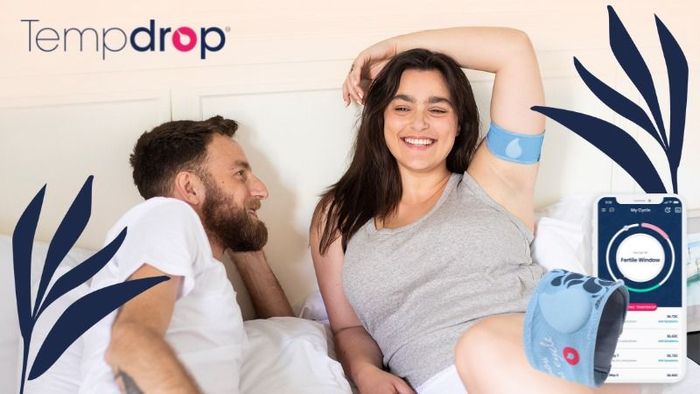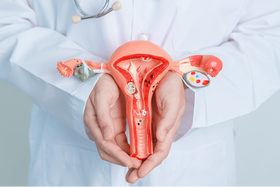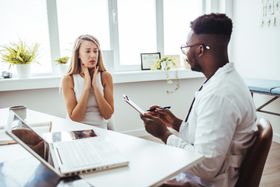Tempdrop vs. Ava Fertility Trackers: Which is Best for You?
Updated September 12, 2023.

Growing up, many of us were not made to understand our fertility and menstrual cycles until it was finally time to get pregnant. Despite what you've been taught, or the myths you may have heard, you are only fertile 6-7 days per cycle! So, if you're looking to achieve pregnancy, it is key to understand when those fertile days are.
The best way to understand your cycles is by tracking them with the fertility awareness method. There are numerous methods out there, so make sure you choose a method that is best for you and your current life goals. Various methods typically include a combination of cervical fluid, basal body temperature, cervix positioning, and/or urinary hormones.
I use and teach the symptothermal method, which includes basal body temperature and cervical fluid monitoring. Our basal body temperature is overall low before ovulation and rises after ovulation. So, when we use this in combination with our cervical fluid, we can accurately identify our fertile window.
If you're interested in using basal body temperature to track your fertility, you've likely already seen there are so many basal body thermometers out there, including numerous wearable BBT devices or some known as wearable ovulation trackers. For some people, these wearable fertility tracking devices can help them track data more accurately and can be incredible tools for confirming ovulation, tracking general health, and achieving personal fertility goals.
So, I wanted to take a little time to compare two of the devices I commonly get asked about, Tempdrop and the Ava Bracelet, in the hope that this will support you in choosing the best fertility tracker device, the one that best fits your needs.
Tempdrop vs. Ava at a Glance
| | Tempdrop | Ava Bracelet |
|---|---|---|
| User Experience | Worn high up on the arm while you sleep | Worn on the wrist while you sleep |
| Main Features | Continuously tracks data throughout the night while you sleep In-app cycle and fertility tracking, and sleep tracking | Continuously tracks data throughout the night while you sleep In-app cycle, fertility, and pregnancy tracking |
| Fertile Window Interpretation | Option to use fertility predictions or turn them off to interpret your own data | Uses fertility predictions |
| Suitable for Irregular Cycles or Changing Sleep Patterns | Yes | Only recommended for regular cycles 24-36 days |
| FDA Regulation | FDA registered | FDA-approved for conception only |
| Price | Starting at $199 | Starting at $279 |
| Insurance Coverage | HSA + FSA eligible | HSA + FSA eligible |
Tempdrop Fertility Tracker
How does Tempdrop work?
Tempdrop is a wearable basal body thermometer (BBT) sensor that contains multiple sensors that measure your core temperature continuously throughout the night. When synced to the app, Tempdrop’s patented algorithm learns your unique nightly and monthly temperature patterns, filtering out disturbances for accurate results.
The Tempdrop app allows people to track key fertility indicators to increase their chances of conceiving.
» Read full Tempdrop fertility tracker review
Is Tempdrop HSA eligible?
Yes, Tempdrop is both HSA and FSA eligible. HSA/FSA plans usually cover over-the-counter and basal body thermometers; however, be sure to check the details of your individual plan to see what exactly is covered.
Is Tempdrop an FDA-approved fertility tracker?
Yes, Tempdrop is an FDA-registered wearable fertility tracker and app.
Pros
- Easy to use
- The algorithm makes charting easy
- Suitable even for those who have irregular cycles
- Offers the option to track additional fertility awareness findings in the app
- Suitable for those with irregular schedules and/or irregular sleep patterns
Cons
- Not everyone feels comfortable using an app to track their data
- Requires you to wear a device overnight
Ava Fertility Tracker
Ava Bracelet is a wearable device that collects continuous data while you sleep and uses this data to predict when you're fertile. Once synced with the corresponding app, this data, along with the user’s fertility status, is displayed in real-time.
What does Ava use to track ovulation?
Ava uses five physiological parameters to track ovulation and advance the understanding of the menstrual cycle. These five signals are resting pulse rate, breathing rate, skin perfusion, heart rate variability, and basal body temperature
Is Ava HSA eligible?
Yes, Ava is both FSA and HSA eligible. In many cases, HSA/FSA plans cover fertility monitors; however, be sure to check the details of your individual plan to see what is covered.
Does Ava’s fertility bracelet really work?
A small study conducted in 2021, focused on the Ava device and its effectiveness in identifying fertile and infertile days in the menstrual cycle, has shown the device to be accurate.
Pros
- Easy to use
- Offers the option to track additional fertility awareness findings in the app
Cons
- Not suitable for those who have irregular cycles
- Not everyone feels comfortable using an app to track their data
- Requires you to wear a device overnight
» Learn more about the best BBT thermometers to track fertility
Tempdrop vs. Ava: User Experience
How to wear/use Tempdrop?
Tempdrop BBT wearable tracker is worn over the axillary artery (just below the armpit) overnight while sleeping and synced with an app the next morning for data. To find the correct placement, flex your arm and find the soft area between the bicep and triceps. If you are curvier, wear it closer to your armpit over the thinnest skin.
How to wear/use Ava?
Ava is worn on the wrist overnight while sleeping and synced with an app the next morning for data. To find the correct placement, it is worn over the wrist bone like a watch.
» Discover the best fertility and ovulation trackers for a 2024 baby
Tempdrop vs. Ava: Main Features
Both devices allow people to track both the data from the device as well as additional cycle/fertility-related information to make informed decisions about fertility. Ava is specifically geared toward those who desire pregnancy only.
Personally, I like that Tempdrop is fitting for those with any type of cycle and any type of fertility or health goal, which Ava is not. I also strongly encourage people to interpret their own fertility rather than relying on a device to tell them when they are fertile and when they are not—Tempdrop allows you to leave predictions off and trust your own knowing!
Winner: Tempdrop
Tempdrop vs. Ava: Price
Is Tempdrop worth it?
Tempdrop pricing starts at $199 and goes up to $284 if you want insurance and a 12-month refund , with extended 2 year warranty.
Ava, is it worth it?
Ava pricing starts at $279 and goes up to $359 if you want the premium package, including a full refund if you're not pregnant within 6 months.
Overall Winner?
For me, the best wearable ovulation tracker is Tempdrop, for myself and my clients. I prefer a device that is suitable for all stages and current health and fertility goals and one that allows people to use their own body literacy.





